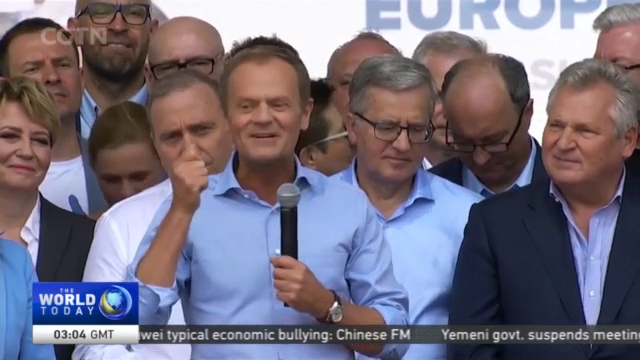
12:10, 23-May-2019
European Parliament Elections: Four-day election across 28 member states begins Thursday
Updated
12:10, 26-May-2019
02:58

It's election week for the 28 nations that make up the European Union. Over the next four days, voters will choose the members of parliament who will shape the bloc's political and economic direction over the next five years. CGTN's Mariam Zaidi reports.
Could this be the most important EU parliamentary election in a generation? From Thursday through Sunday, as voters go to the polls, a real battle for Europe could be on the cards.
The last time Europe voted, in 2014, populists, nationalists and anti-establishment parties used the fear of migration and failed national government policies to breakthrough in bigger numbers than ever seen before, topping polls in France, Poland, Hungary and the UK. They also made gains in Italy, Spain and Germany.
European Council President Donald Tusk has himself been busy throwing his support behind pro-EU candidates in the UK and in his homeland.
DONALD TUSK EU COUNCIL PRESIDENT "By voting for Europe and for a strong Poland in Europe, you also vote for a free, democratic Poland without fear, without coercion, without contempt for one another. This is today the most important guarantee of our Polish freedom, our Polish security. Everything is in your hands. Give up doubt and fear."
But polls suggest Euroskeptics are on course to make gains again in 2019.
And after the UK bungled Brexit, a newly formed anti-EU "Brexit Party" could bolster anti-establishment forces even further. Even if their presence in parliament may be only temporary.
So what's up for grabs? First off, 751 seats. They are allocated on the basis of what's known as "degressive proportionality". Larger countries such as Germany, France, the UK and Italy have the most MEPs, but represent more citizens than those from smaller countries such as Luxembourg or Malta, which are guaranteed at least six seats.
MEPs elected nationally then sit in pan-European groupings. There are 8 political groups made up of both left and right leaning parties with some more extreme than others.
Europe's far-right may grow in numbers but they are not expected to gain a majority in 2019. But their gains could make EU decision making more difficult.
Especially as projections suggest the two major political groups - the right leaning European People's Party and the center left Social Democrats could lose their overall majority. They're likely to get the biggest votes but their share could be depleted.
MARIAM ZAIDI BRUSSELS "On Sunday, just after 11 pm local time in Belgium, the first official projection will come in. Who will be the big winners and losers? Find out on the night! Mariam Zaidi, CGTN, Brussels."

SITEMAP
Copyright © 2018 CGTN. Beijing ICP prepared NO.16065310-3
Copyright © 2018 CGTN. Beijing ICP prepared NO.16065310-3